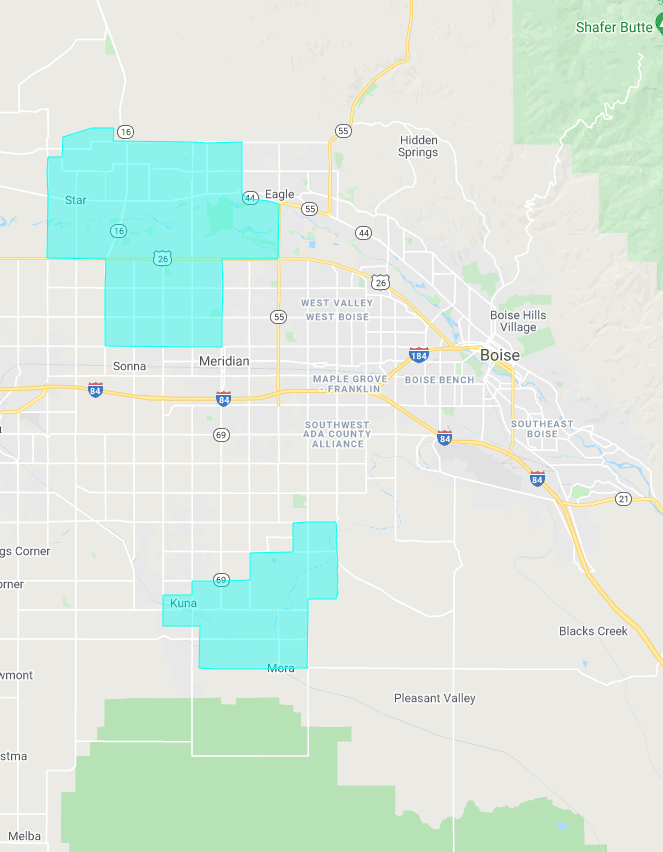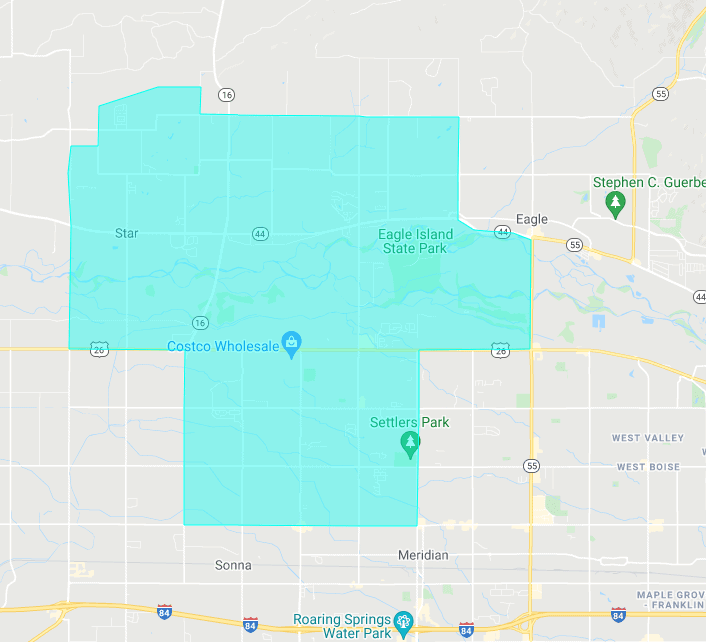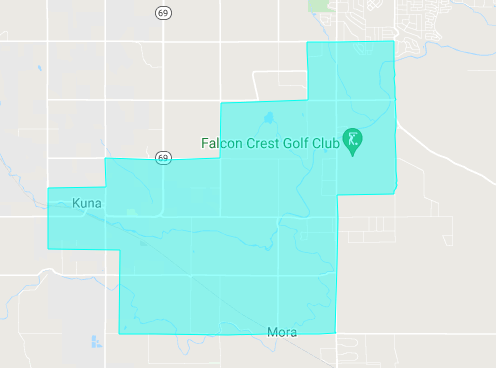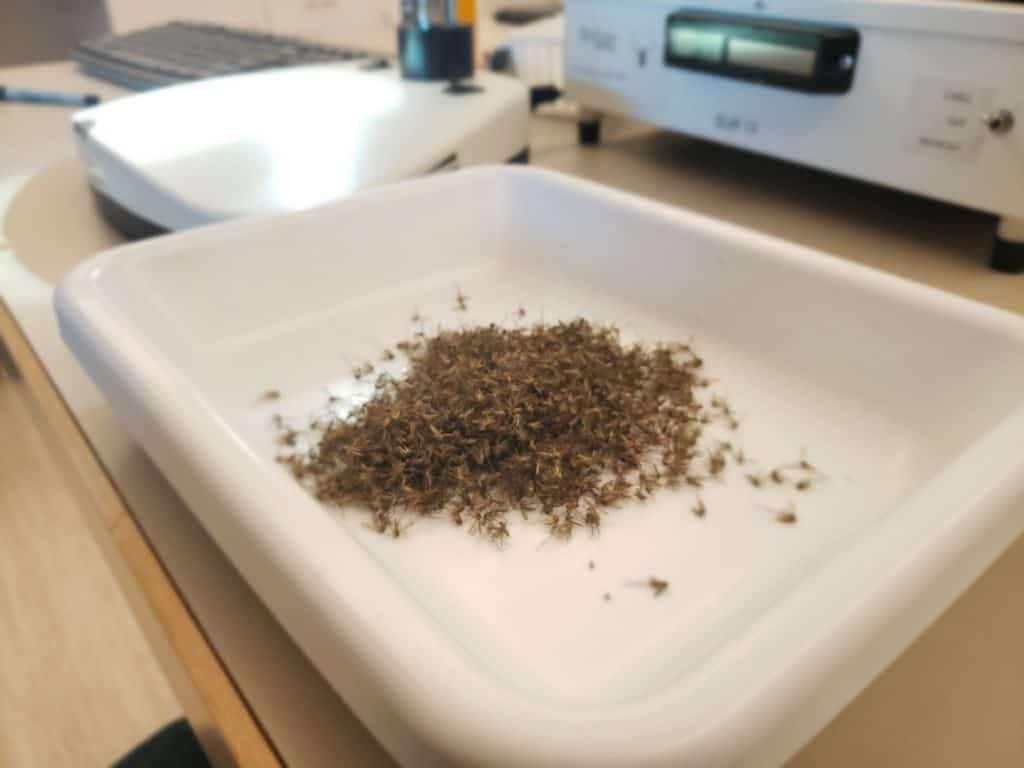The Ada County Mosquito Abatement District (ACMAD) will conduct aerial applications to control adult mosquitoes in North Meridian, Star, West Eagle and Kuna (see attached maps for reference) between 8:30 PM and midnight on Thursday August 19, 2021, weather permitting. Applications via twin-engine aircraft are scheduled to reduce populations of mosquitoes with high levels of West Nile virus (WNV) found within the district. WNV is transmitted to humans through mosquito bites and in some cases can cause severe symptoms.
To treat populations of flying mosquitoes, the aircraft will apply the product Dibrom® Concentrate to 38,400 acres from an altitude of 300 feet, and at a rate of 0.6 ounces per acre. Dibrom® Concentrate is regulated by the Environmental Protection Agency (EPA) and it is specifically developed and rigorously tested for use in heavily-populated areas. The product is extremely effective at controlling mosquitoes, is not harmful to humans or pets, and dissipates quickly. Because the applications will take place in the evening, they will not harm beneficial pollinators. For those with home gardens, it is recommended to simply rinse produce as you normally would before consumption.
For more information on the use of aerial applications to control mosquitoes, the EPA fact sheet can be found, here.
In the event the application cannot take place on the date scheduled, it will be made on the next available night. ACMAD’s ongoing larvicide and adulticide operations will continue to protect Ada County residents from WNV while adhering to Integrated Mosquito Management principles.
Additional information about the product used for aerial mosquito control applications can be found, here. To follow the current mosquito activity, visit the “Mosquito Tracker.”
Aerial Application FAQs:
- Can we opt out?
- You may opt-out of our standard mosquito fogging services by completing the “no-spray or notify” forms listed on our website. However, aerial applications are designed to treat large areas, and if your home is within the treatment block, the mosquitoes in your neighborhood will be controlled. We are planning aerial applications due to the high prevalence of West Nile virus found in the mosquito populations within the treatment area.
- What did you use?
- We are planning to apply a product called Dibrom – which has been approved by the Environmental Protection Agency for applications to mosquito populations in high density urban settings. We are applying Dibrom in an ultra-low volume fog that disperses very fine aerosol droplets that kill mosquitoes on contact, and poses minimal exposure and risk to humans, animals and the environment. Dibrom begins to break down immediately and will be virtually non-detectable by the following morning.
- Will it harm my organic garden?
- While there is a potential for small amounts to reach growing crops, the likelihood is very small due to the nature and rapid breakdown of the product and the application rate. After broadcast applications, it is recommended that you rinse your vegetables before consumption – like you would normally whether from the store or daily harvested from your backyard gardens.
- Will it hurt my animal? Cow, horses, birds, dogs, cats?
- Dibrom is not harmful to wildlife, pets, fish, birds, or livestock at the rates applied for adult mosquito control. However, if you would like to reduce your pet’s exposure, keep them inside during spraying times.
- Will it hurt fish
- Dibrom has no aquatic set back requirements and in true environmental conditions during actual applications made for adult mosquito control, Dibrom dissipates rapidly and can be used without adversely affecting non-target aquatic organisms in most circumstances.
- I think I am having an allergic reaction to your treatment.
- If you are in need of medical attention, please see a licensed physician.
- Is this an adulticide or larvicide treatment?
- This particular aerial application is designed to kill adult flying mosquitoes. However, we locate, identify and treat mosquito larvae and development sites as part of our standard mosquito abatement operations.
- Can I smell it?
- Because we use ultra-low volume applications, you aren’t likely to breathe or touch anything that has enough insecticide to harm you and it is unlikely that you will be able to smell it.
- When can I or my kids go outside? Do I need to wash off my patio tables, cars house?
- You do not need to leave an area or shelter when an ultra-low volume aerial application is happening. The insecticide we use immediately begins to break down after application and is virtually undetectable by the next morning. There is no need for special sanitation practices following an ultra-low volume application. More commonly, if concerned and would like to minimize exposure, during the application time and within an hour of remain in doors and close windows. Once the application period has passed you may open your windows again.
- Will it hurt bees?
- Dibrom can kill bees when applied during day, However, we treat at dusk and into the evening hours well after bees are done foraging for the day. Beekeepers can protect their bees by covering hives if they are within the treatment area if they so choose – however; this is not required.
- Are my fruits and vegetables safe to eat?
- After a broadcast application, it is recommended that you rinse your vegetables before consumption – like you would normally.
- Will this impact my pregnancy?
- Studies in experimental animals have not shown Dibrom to cause cancer, birth defects, or adverse effects on reproduction. Additionally, there have been no findings or reports of increased cancer among workers involved with manufacturing or applying Dibrom Concentrate (highest exposure potential) nor the communities where Dibrom is used in mosquito control. If you are concerned about exposure and you reside within the treatment area, please stay indoors and close the windows during the application. No further safety precautions are necessary.
- Why are you doing it this year when you did not last year.
- We perform aerial applications when the following thresholds have been met:
- When West Nile virus is widespread in mosquito populations throughout the district
- When standard ground fogging services are not able to control rising mosquito populations
- When the threat of disease exposure to humans is high
- We perform aerial applications when the following thresholds have been met:
- Do I need to close my windows?
- It is not necessary to close your windows, that is up to an individual’s personal preference and even then, only during the application treatment window.
Other facts to be considered:
- The amount of insecticide used during an aerial application equates to roughly one-half of a shot glass over the area of a football field (0.6 ounces per acre).
- Constituents could see or hear low-flying aircraft over their neighborhoods. Only neighborhoods or properties within the designated treatment areas are being treated. The aircraft could be flying over in an approach or a turn.




